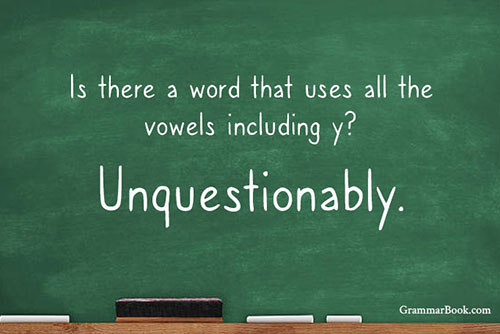|
English includes different kinds of pronouns, such as personal, demonstrative, relative, reflexive, possessive, and interrogative pronouns. In this review, we'll take a closer look at indefinite pronouns.
An indefinite pronoun is one that refers to an unspecified or unidentified person or thing. Unlike a definite pronoun, it is vague, and it does not have an antecedent.
She drives the car. (The pronoun reference is specific to a person.)
Anyone can drive the car. (The pronoun reference is general; no particular person is identified.) |
Indefinite pronouns can also refer to nouns or noun phrases that have been named or will be named:
Thousands of microbreweries have sprouted up in the U.S., but few are as good as that one. (general reference to a nonspecific group of microbreweries)
Many of those dog owners have their pet groomed every month. (nonspecific reference to a general group of dog owners)
|
The following table includes common indefinite pronouns:
| all |
everyone |
none |
| another |
everything |
no one |
| any |
few |
nothing |
| anybody |
less |
one |
| anyone |
many |
other(s) |
| anything |
more |
several |
| both |
most |
some |
| each |
much |
somebody |
| either |
neither |
someone |
| everybody |
nobody |
something |
Now let's look at indefinite pronouns in subcategories that help to further define them: quantifiers, universals, partitives, and determiners.
Indefinite Pronouns: Quantifiers
When an indefinite pronoun suggests the quantity of something, it acts as a quantifier. Quantifying indefinite pronouns include words such as more, some, many, and few.
Some of you will just never see the genius behind the lawnmowing app I invented. (The indefinite pronoun some indicates an unknown, nonspecific number in a group.)
Many will be responsible for flying their own kites. (The indefinite pronoun many indicates an unknown, nonspecific number of people.) |
Indefinite Pronouns: Universals
When an indefinite pronoun indicates a general, all-inclusive group, it acts as a universal. Universal indefinite pronouns include words such as each, both, all, and everyone.
Everyone can join us at the picnic by the lake. (The indefinite pronoun everyone is all-inclusive and nonspecific.)
Both may prove to be the winners. (The indefinite pronoun both indicates an unknown, unspecific pair of people; note that in this sentence the pronoun does not have a clear antecedent; the word winners is a predicate nominative in the infinitive phrase to be.) |
Indefinite Pronouns: Partitives
When an indefinite pronoun indicates parts of a whole, it acts as a partitive. Partitive indefinite pronouns include words such as any, anyone, either, and neither.
Anyone can sign up for the free hula hoop lesson. (The indefinite pronoun anyone suggests individual members of an unknown, nonspecific group; while the difference may be subtle, this pronoun has a more segmented meaning than everyone.)
Either may stand watch at the gate. (The indefinite pronoun either suggests an unknown, unspecific pair of people; the key here as in the universal both above is that the sentence does not have a clear antecedent, which makes the pronoun indefinite.) |
Indefinite Pronouns: Determiners
Indefinite pronouns can serve as determiners, which modify nouns rather than act or stand in for them.
Some senior citizens like amusements parks. (Some is a determiner acting as an adjective modifying senior citizens; compare this usage with some like amusement parks.)
Few musicians become millionaires. (Few is a determiner acting as an adjective modifying musicians; compare this usage with few become millionaires.) |
Related Topic
Anymore, Any more; Anyone, Any one; Everyone, Every one; Everybody, Every body
Subject and Verb Agreement with Collective Nouns
|





